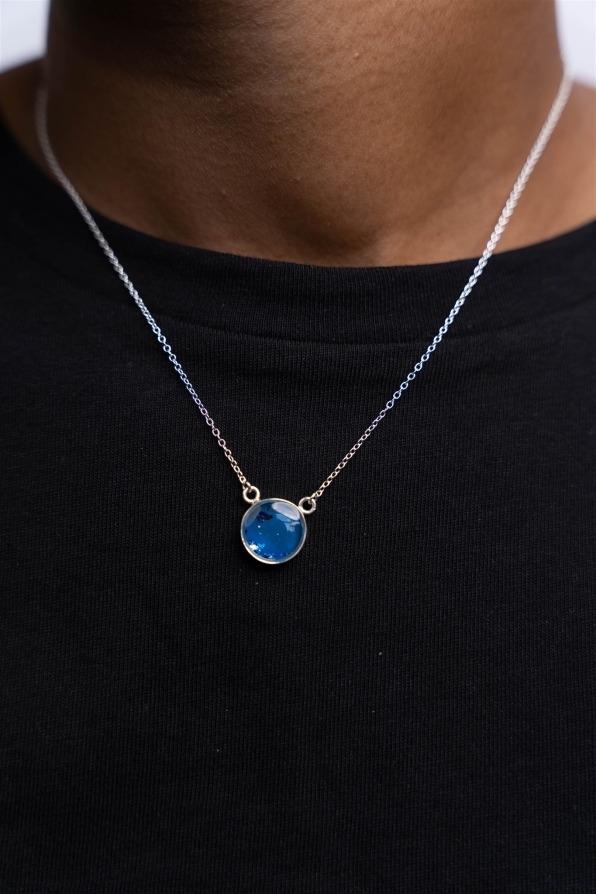How a Detroit company is lifting women out of poverty by transforming graffiti into jewelry
By Francine Maroukian
More than a half century after it first began to appear on subway cars and concrete walls, spray paint graffiti has become part of the urban landscape. Some see it as artistic expression with cultural value; others see property-defacing vandalism. But to Amy Peterson, founder of Rebel Nell, a mission-driven jewelry company in Detroit, graffiti looks like opportunity.
The notion first occurred to Peterson as she walked along the Dequindre Cut Greenway, a below-street level path on the old rail lines owned by Grand Trunk Railroad, where graffitists have tested their skills on building walls and bridge abutments for decades. Because expansive outdoor surfaces are graffitied repeatedly, the layers of accumulated paint take on extra weight, and time and weather cause it to flake and fall to the ground. “One day, I picked up a piece and thought how beautiful it was,” Peterson says. “Then I noticed all the layers that made up just that one piece. That’s when I had the idea of giving fallen pieces of graffiti second life as wearable art.”
At the time, Petersen was working as the first-ever female associate counsel for the Detroit Tigers and living next door to COTS (Coalition on Temporary Shelter), a well-known women and family shelter in Midtown Detroit. Growing frustrated with her day job, Petersen decided it was time to channel her restlessness into a different kind of civic activity—work still rooted in Detroit, but with more meaningful community involvement. In getting to know her COTS neighbors, she found her mission: a company dedicated to helping unemployed women who might otherwise remain overlooked and undervalued.

And so Peterson founded Rebel Nell (the company name is a play on Eleanor Roosevelt’s childhood nickname, Little Nell) as a limited low-profit liability company. The relatively new private business structure (L3Cs first emerged in 2008) prioritizes social enterprise without sacrificing economic success. “In other words, we exist to fulfill our mission and do it profitably, not the other way around,” she says.
That was 2013, the year Detroit filed for Chapter 9 bankruptcy. Downtown Detroit felt abandoned. “You could fire a cannon down Woodward Avenue during rush hour and not hit a soul,” says Peterson. “At the time, the media was trashing Detroit, but I saw a different city, one built on persistence and optimism. Like the fallen graffiti, Detroit is made up of many layers of people, history, and ideas.”
With no shortage of abandoned buildings as blank canvases for graffitists, Peterson and work partner Diana Roginson began collecting fresh paint flakes and started their jewelry-making experimentation. Through trial and error, they developed a process by which the layers of the paint are peeled back, exposing its color history, and giving the finished jewelry its signature kaleidoscopic/psychedelic look, a process they have trademarked.

In the earliest stages, lacking the funds to purchase metal jewelry components, Peterson used old metallic glass Christmas tree ornaments as backings for the paint. Today, Rebel Nell’s creative designers cut sterling silver to match the pattern and shape of the treated graffiti, adhere the paint to the metal, and apply protective resin to further bring out the colors. Although Rebel Nell continues its “no peel” policy, relying only on pieces that have flaked and fallen of their own accord, they have expanded their product range beyond jewelry into pet tags, key chains, bottle stoppers, golf ball markers and divot tools, and other lifestyle accessories.
When packaged for sale, each item includes a note about the paint provenance, flakes collected from diverse locations like University of Michigan’s activist-graffitied boulders to a Detroit Red Wings hockey team collaboration, with paint remnants Peterson swept up from the sidewalk with a broom and a box during the demolition of the Joe Louis Arena, the NHL team’s home until 2017.

To help reset the course of their lives, Rebel Nell employees are not just educated in jewelry design, customer service, and other transferable workforce skills, but receive individualized support, including financial literacy, life wellness, legal aid, housing resources, résumé coaching, career education, micro-loans, and other wrap-around programs designed to assist with transitions to self-sufficiency and equitable opportunity.
In 2016, Peterson helped found T.E.A. (Teach. Empower. Achieve.), a 501c3 workforce development organization that assists unhoused women facing barriers to employment (often those experiencing the trilemma of unemployment, housing insecurity, and domestic violence). Through this stand-alone nonprofit partner, Peterson can expand opportunities with shelters throughout the Detroit area, meeting even more women who are ready for the transitional opportunity provided at Rebel Nell. Over the years, the business has racked up over 30,000 skill development hours, and 97% of Rebel Nell team members secured stable housing.

Although her current income doesn’t match her former Tigers salary, Peterson is able to support herself with the income from Rebel Nell. “We pride ourselves on being self-sufficient, meaning the work we do is completely funded by the sales of our jewelry,” she says.
The funding process to get Rebel Nell operational was diverse: They bootstrapped. Self-financed. Did small pitch competitions, a crowd-funding campaign, and took on their first investors in 2016, the same year Peterson and her partner were awarded “Entrepreneur of The Year” by Ernst & Young. And like millions of other small businesses, Rebel Nell has since been helped with an EIDL (Economic Injury Disaster Loan), the federal program supporting small business recovery from the COVID-19 economic impacts.
“We have certainly had our ups and downs,” says Peterson, citing the challenges of navigating the pandemic. But the business has grown steadily since 2017, and through the first quarter of 2023, sales were up 40% over Q1 2022. “We are optimistic that this will be our best year yet” Peterson says. “Our products are high quality, tell a story, and have a tremendous amount of impact.”
Francine Maroukian, two-time James Beard Award winner, is a former food and travel writer-turned-commercial-pragmatist, who now works as an operative researcher for C-suite executives in big retail.
(13)



